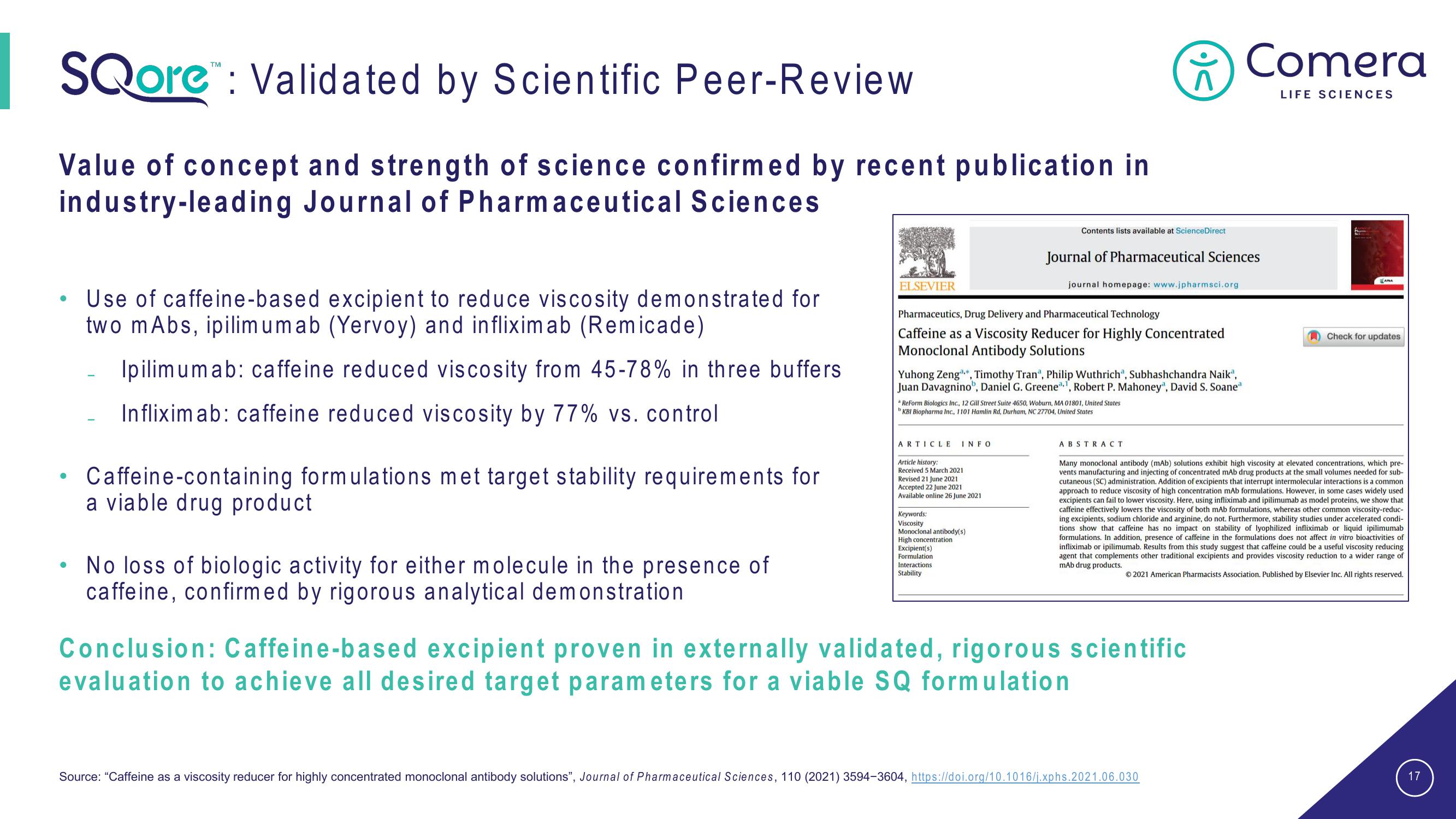Comera SPAC Presentation Deck
SQore™: Validated by Scientific Peer-Review
Value of concept and strength of science confirmed by recent publication in
industry-leading Journal of Pharmaceutical Sciences
●
●
●
Use of caffeine-based excipient to reduce viscosity demonstrated for
two mAbs, ipilimumab (Yervoy) and infliximab (Remicade)
Ipilimumab: caffeine reduced viscosity from 45-78% in three buffers
Infliximab: caffeine reduced viscosity by 77% vs. control
Caffeine-containing formulations met target stability requirements for
a viable drug product
No loss of biologic activity for either molecule in the presence of
caffeine, confirmed by rigorous analytical demonstration
ELSEVIER
ARTICLE
Pharmaceutics, Drug Delivery and Pharmaceutical Technology
Caffeine as a Viscosity Reducer for Highly Concentrated
Monoclonal Antibody Solutions
INFO
Contents lists available at ScienceDirect
Yuhong Zeng, Timothy Tran, Philip Wuthrich, Subhashchandra Naik,
Juan Davagnino, Daniel G. Greene,¹, Robert P. Mahoney, David S. Soane
ReForm Biologics Inc., 12 Gill Street Suite 4650, Woburn, MA 01801, United States
DKBI Biopharma Inc., 1101 Hamlin Rd, Durham, NC 27704, United States
Article history:
Received 5 March 2021
Revised 21 June 2021
Accepted 22 June 2021
Available online 26 June 2021
Keywords:
Viscosity
Monoclonal antibody(s)
High concentration
Excipient(s)
Formulation
Interactions.
Stability
Journal of Pharmaceutical Sciences
journal homepage: www.jpharmsci.org
(•)<)
ABSTRACT
Conclusion: Caffeine-based excipient proven in externally validated, rigorous scientific
evaluation to achieve all desired target parameters for a viable SQ formulation
Comera
Source: "Caffeine as a viscosity reducer for highly concentrated monoclonal antibody solutions", Journal of Pharmaceutical Sciences, 110 (2021) 3594-3604, https://doi.org/10.1016/j.xphs.2021.06.030
LIFE SCIENCES
APRA
Many monoclonal antibody (mAb) solutions exhibit high viscosity at elevated concentrations, which pre-
vents manufacturing and injecting of concentrated mAb drug products at the small volumes needed for sub-
cutaneous (SC) administration. Addition of excipients that interrupt intermolecular interactions is a common
approach to reduce viscosity of high concentration mAb formulations. However, in some cases widely used
excipients can fail to lower viscosity. Here, using infliximab and ipilimumab as model proteins, we show that
caffeine effectively lowers the viscosity of both mAb formulations, whereas other common viscosity-reduc-
ing excipients, sodium chloride and arginine, do not. Furthermore, stability studies under accelerated condi-
tions show that caffeine has no impact on stability of lyophilized infliximab or liquid ipilimumab
formulations. In addition, presence of caffeine in the formulations does not affect in vitro bioactivities of
infliximab or ipilimumab. Results from this study suggest that caffeine could be a useful viscosity reducing
agent that complements other traditional excipients and provides viscosity reduction to a wider range of
Ⓒ2021 American Pharmacists Association. Published by Elsevier Inc. All rights reserved.
mAb drug products.
Check for updates
17View entire presentation